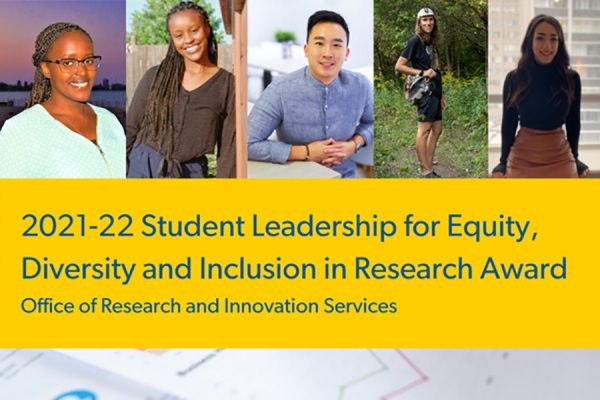
Students win recognition for leadership on equity, diversity, and inclusion in research Staecey Ngabire, Larissa Dushime, Arief Kartolo, Janet MacIsaac, and Natalie Hazineh are among the recipients of Student Leadership Awards for Equity, Diversity, and Inclusion. Not pictured: Renee Taylor. The Office of Research and Innovation Services has recognized six students from various disciplines who are making the campus community more welcoming by working to develop more equitable and inclusive research. The Student Leadership Awards for Equity, Diversity, and Inclusion carry with them a $500 prize. Renee Taylor, a graduate student in psychology, was nominated by professor Ben H.C. Kuo for her work on Black experiences in education and mental health services in Canada, as well as for her on- and off-campus contributions to supporting a more equitable community, such as participating as a panellist in a roundtable co-hosted by the federal Anti-Racism Secretariat and serving as a student representation on the Equity, Diversity and Inclusion Committee of the Faculty of Arts,…
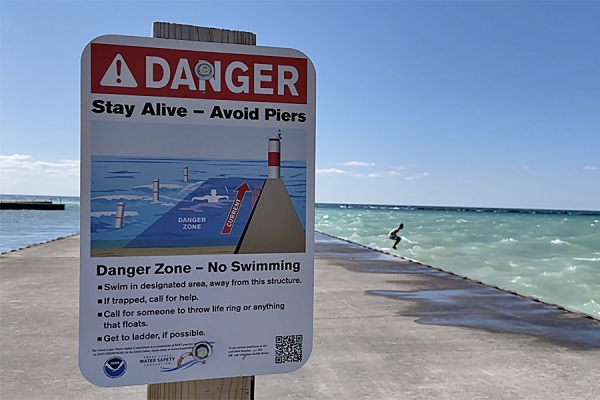
Warning system to prevent beach drownings An innovative dynamic warning system will protect Great Lakes beachgoers from drowning. UWindsor researchers along with community partners in Bruce County are creating a real-time dynamic warning system to protect Great Lakes beach users from drowning. This system will be the first of its kind in North America. The Mitacs Accelerate proposal, called “Socially and physically based surf warning system to improve beach safety,” is led by researcher Chris Houser in collaboration with Bruce County, the Municipality of Kincardine, and the Municipal Innovation Council. The three-year project will start in summer 2022 at Station Beach in Kincardine, Ontario. Using automated beach activity cameras, sensors, meteorological stations, and artificial intelligence, the team will create the unique system. Members will deploy an integrated sensor network that includes water level and wave sensors as well as traffic and pedestrian sensors. The cameras will follow protocols to anonymize faces.…
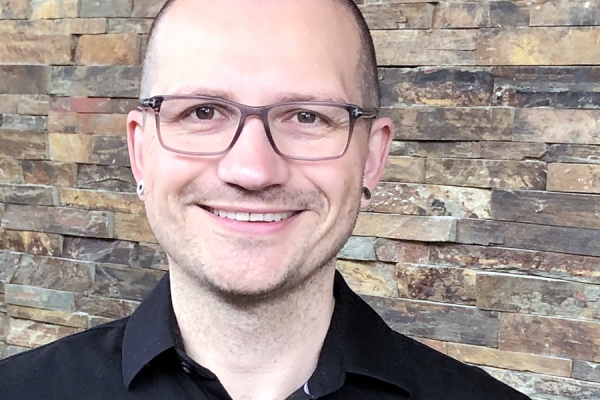
Social work professor lauded for research into HIV/AIDS Social work professor Adrian Guta has been named the recipient of the Excellence in Research Award in the social sciences track by the Canadian Foundation for AIDS Research and the Canadian Association for HIV Research. Social work professor Adrian Guta has won national acclaim for his HIV and AIDS research. The Canadian Foundation for AIDS Research and the Canadian Association for HIV Research have named the UWindsor professor this year’s recipient of the Excellence in Research Award for social sciences. The award celebrated the contributions of Canadian researchers in HIV/AIDS research in Canada and internationally. “I’m honoured to be recognized by my research community and the two organizations that have been central in supporting HIV research in Canada,” Dr. Guta said of the award. Guta has been involved in HIV research for 18 years and has received funding from the Canadian Institutes of Health Research and the Ontario HIV Treatment Network. For more than a decade, he…
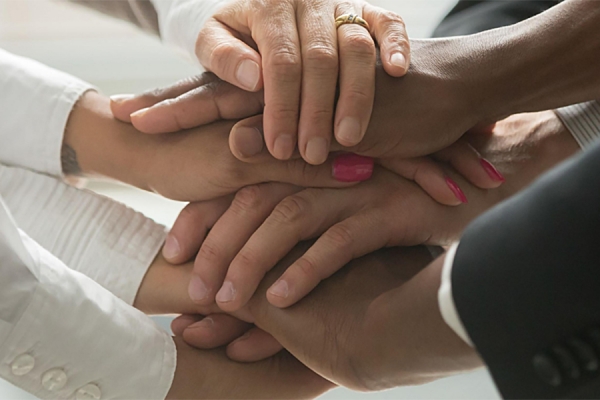
WE-SPARK Health Institute Releases 3rd Quarter Progress Report WE-SPARK Health Institute Releases 3rd Quarter Progress Report WE-SPARK Health Institute has released its Year 3, Q3 report highlighting key metrics from November 2021 - January 2022. The report communicates outcomes and provides accountability to its members and the Windsor-Essex community. Highlights include: Increased membership by 48 from Q2 to 806 members; Grew Student Volunteer Network to 24 students, logging over 900 hours this quarter; Developed and launched a customized mobile & web app to support collaborative research projects; Facilitated 6 Clinical Professor Appointments and 1 Professor of Practice in the Department of Biomedical Sciences University of Windsor to support local physicians and healthcare providers build their research programs; Launched a WE-SPARK “Engage” Program to provide an easy way for community members to participate in health research; Hosted a “mixer” event that paired medical students with researchers; and Developed a plan that connects…

Application to support research collaboration A customized mobile and web app is intended to support collaborative research projects across Windsor-Essex. WE-Spark Health Institute has developed a customized mobile and web app to support collaborative research projects across Windsor-Essex. The app seamlessly connects clinicians and researchers from across its four partner institutions — the University of Windsor, Hôtel-Dieu Grace Healthcare, St. Clair College, and Windsor Regional Hospital — to share ideas, spark collaboration, and provide quick access to tools, resources, and events. “At WE-Spark, collaboration is at the heart of everything we do,” says executive director Lisa Porter. “Windsor-Essex has all the expertise we need to drive discovery and solutions, and this new tool in our toolbox will make it faster and easier for our research community to find each other to make it happen.” Future iterations will include expanding the tool so students and the Windsor-Essex community can learn about and participate…
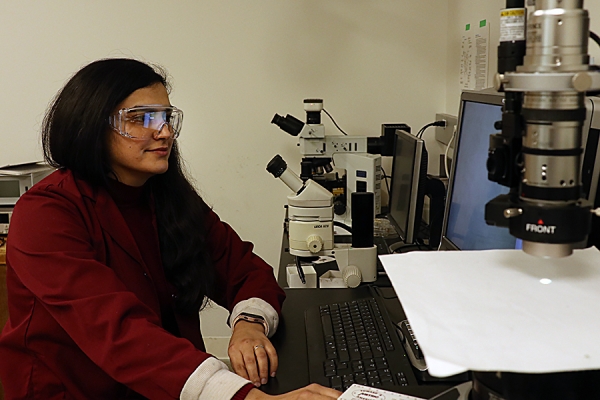
Science scholarships attracting international doctoral students A scholarship that covered the difference in tuition fees between international and domestic students helped attract doctoral candidate Fatemeh Motaghedi to the University of Windsor from Iran. A scholarship program launched in 2021 by the Faculty of Science has attracted 13 new international doctoral students, bringing global expertise to the University of Windsor. The scholarship is equal to the difference between international and domestic tuition, effectively allowing select international PhD students to pay domestic tuition rates. Fatemeh Motaghedi is a chemical engineer from Iran. She joined the doctoral program in the Department of Chemistry and Biochemistry specifically because of the new scholarship. “The scholarship attracted me to the University of Windsor and I was really excited to get the chance to come,” says Motaghedi. “This is a great opportunity for International students.” Motaghedi is supervised by professors Simon Rondeau-Gagné and Tricia Carmichael. Dr.…
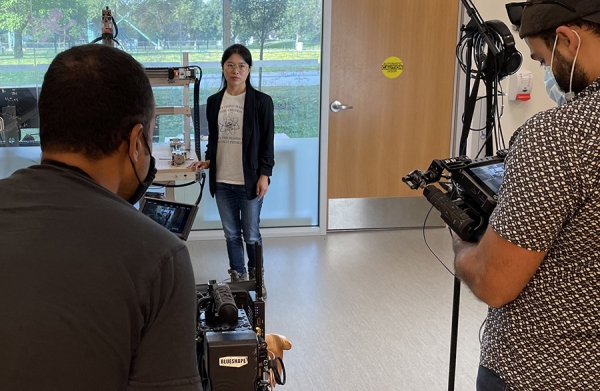
Videos highlight science student experience Physics professor Dan Xiao takes her turn in front of the camera for a series of videos promoting teaching and research in science. The Faculty of Science is collaborating with an alumnus director and producer to create eye-catching videos that highlight the exciting student experience and research taking place at the University of Windsor. “We are creating a clear and exciting brand, and it has made an amazing difference to recruitment and our reputation,” says dean of science Chris Houser. The latest four videos are featured on the faculty’s Science UWindsor YouTube site: Join us at the leading edge of Chemistry and Physics Join us at the leading edge of Health and Biomedical Sciences Faculty spotlight video I (Chemistry, Biomedical Sciences, Physics, Biology, Environment, Computer Science) Faculty spotlight video II (Economics, Mathematics and Statistics, and Computer Science) “We’ve made two Faculty Spotlight videos and they give us the opportunity to introduce our…

WE-SPARK launches app to support collaborate health research projects across Windsor/Essex WE-SPARK Health Institute has developed a customized mobile and web app to support collaborative research projects across Windsor/Essex. The app seamlessly connects clinicians and researchers from across our four partner institutions, Hôtel-Dieu Grace Healthcare, St. Clair College, the University of Windsor and Windsor Regional Hospital to share ideas, spark collaboration and provide quick access to tools, resources and events. “At WE-SPARK, collaboration is at the heart of everything we do. Windsor/Essex has all the expertise we need to drive discovery and solutions, and this new tool in our toolbox will make it faster and easier for our research community to find each other to make it happen” said Lisa Porter, Executive Director. Future iterations will include expanding the tool to include students, and to the Windsor/Essex community to learn about and participate in local medical research studies. For more information visit: https://www.wesparkhealth.com/we-spark-app. WE-SPARK Health…
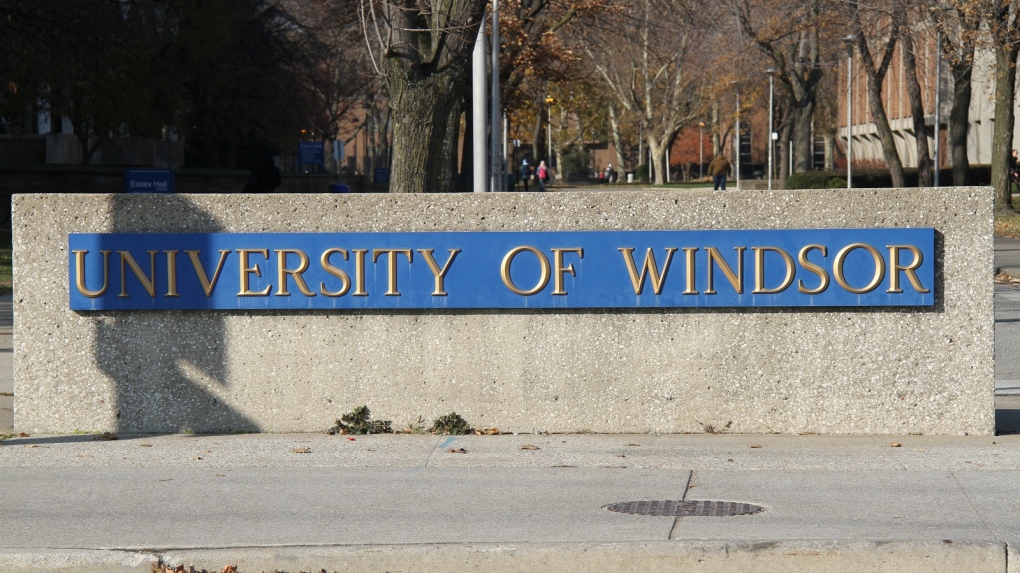
University of Windsor scientists lead team battling prostate cancer The University of Windsor sign is shown in this file photo in Windsor, Ont., on Nov.16. 2012. (Melanie Borrelli / CTV Windsor) Scientists at the University of Windsor are leading a team of researchers in the battle against prostate cancer. Dr. Lisa Porter and Dr. John Trant of the university are working with an international group to find methods of pinpointing aggressive drug-resistant forms of the disease. The aim of the research is to identify alternative protein-markers present in the cancer, thereby increasing the likelihood of an accurate diagnosis. So far, the team has developed a fluorescent probe that can identify proteins that are unique to the aggressive neuroendocrine form of prostate cancer. It is the type of malignancy that is not detectable by the standard PSMA test that doctors use. For Dr. Porter, the findings are promising. "The multidisciplinary approach that we used here also used some new models - so, we used this cool little fish model where we can actually…











